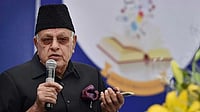Days after BJD MP Satpathy called out Union minister Narendra Singh Tomar to write to him in Odiya or English in response to an official letter in Hindi, the Rural Development minister has now sent a letter in English.
"Hon'ble Sri Tomar has replied in English! Happy. That's the spirit," Satpathy had tweeted on Monday, sharing a picture of the letter sent recently by the Union Minister.
When Satpathy received a letter in Hindi from Union Rural Development, Panchayati Raj and Drinking Water and Sanitation Minister Tomar on August 11 inviting him to a programme by the government, he sent out a reply in Odia telling him that he doesn’t understand Hindi.
Satpathy had then tweeted a picture of the letter with the caption, "“Why are Union Ministers forcing Hindi on non Hindi speaking Indians? Is this an attack on other languages?”
The BJD MP sent back a reply to Tomar in Oriya, "expressing inability to comprehend the Hindi letter."
Satpathy in the letter written in Oriya had said "I can't understand anything written in this letter as I don't understand Hindi language. I would also like to state that our state Odisha falls in the C category so kindly send us letter in English or Odia."
Protesting against the alleged Hindi hegemony by the BJP-NDA led central government, many non-Hindi speaking states have expressed disapproval.
After coming under attack from several quarters, the government had told Parliament in July that it has no intention to impose Hindi over any other Indian language.
All languages are national languages, although Hindi is the official language, said Minister of State for Home Kiren Rijiju, who is in-charge of the Department of official Languages in the central government.
"There is no question of imposition of Hindi over any other language. Hindi is the official language. There is no one language which is national language," he had said in the Rajya Sabha.
At present, there are 22 languages under the 8th Schedule of the Constitution while 38 languages have been listed formally. According to the Ministry of Home Affairs, there are demands for inclusion of 38 more languages in the Eighth Schedule to the Constitution.
Rijiju’s statement had come against the backdrop of allegations from Karnataka and Tamil Nadu that the central government is trying to impose Hindi on non-Hindi speaking states.
The controversy over Hindi being imposed was generated after former President Pranab Mukherjee accepted the recommendation of the Committee of Parliament on Official Language that all dignitaries, including the president and ministers, especially those who can read and speak Hindi, may be requested to give their speech/statement in Hindi only.
Towards the end of July, RSS activist Dina Nath Batra in a recommendation to the NCERT demanded that Urdu and Arabic words to be removed from school text books.
Less than a week ago, Karnataka’s Congress CM Siddaramaiah Karnataka said "imposition" of any language on a state, which has its own official language, is unconstitutional.
His statement comes at a time when pro-Kannada outfits were against use of Hindi on Namma Metro signboards. Siddaramaiah had written to the Centre stating the state government was compelled to ask the Bangalore Metro Rail Corporation to temporarily re-design signboards in stations without the Hindi language


























